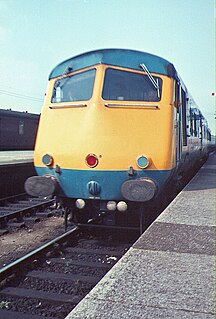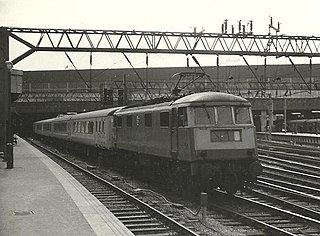Cotswold Rail was an English company, based in Gloucester, which arranged the spot-hire of shunting and mainline locomotives.
FM Rail was a railway charter company based in Derby, England. The company was formed when spot hire company Fragonset Railways and charter operator Merlin Rail merged. It went into administration in 2006.

Riviera Trains Limited is a railway spot-hire company based at Burton-on-Trent and Eastleigh in England.

West Coast Railways (WCR) is a railway spot-hire company and charter train operator based at Carnforth MPD in Lancashire. Using buildings and other facilities previously owned by the Steamtown Carnforth visitor attraction, in June 1998 the company became the first privately owned company to be given a licence as a train operating company.

The Blue Pullmans were luxury trains used from 1960 to 1973 by British Rail. They were the first Pullman diesel-electric multiple units, incorporating several novel features.

The Mark 2 family of railway carriages are British Rail's second design of carriages. They were built by British Rail workshops between 1964 and 1975. They were of steel construction.
Hertfordshire Rail Tours was a company that operated charter trains in the United Kingdom. Founded in Hertfordshire by John Farrow, most of its trains started from London Terminals. The company was purchased by FM Rail in September 2005. FM Rail went into liquidation in December 2006, and the Hertfordshire Rail Tours business passed to Victa Westlink Rail, a joint venture between Victa Railfreight and Westlink.
The Scottish Region (ScR) was one of the six regions created on British Railways (BR) and consisted of ex-London, Midland and Scottish Railway (LMS) and ex-London and North Eastern Railway (LNER) lines in Scotland. It existed from the creation of BR in 1948, and was renamed to ScotRail in the mid-1980s.
A railtour is a special train which is run in order to allow people to experience rail travel which is not available using timetabled passenger services. The 'unusual' aspect may be the route of the train, the destination, the occasion, specific sections of railway track, the locomotive hauling the train, the rolling stock, or any combination of these. Organisers may own or hire locomotives or rolling stock, or tours may be organised by railway management or other bodies outside the railway fraternity. Perhaps the most famous railtour in England was the Fifteen Guinea Special, the last steam hauled main line train run by British Rail. Railtours are often identifiable through the use of a train headboard, often identifying the name of the specific tour or the tour operator. On TOPS, railtours are always given a 1Zxx headcode.

The Deltic Preservation Society is a railway preservation group based in England. The society is dedicated to the preservation and restoration of the remaining Class 55 "Deltic" diesel locomotives operated by British Rail from the 1960s to the 1980s.

Folkestone Harbour station was built to serve the port of Folkestone in Kent, one of four railway stations in the town. It was at the end of the short 1-in-30 Folkestone Harbour Branch Line which joined the South Eastern Main Line at Folkestone Junction. The branch and harbour station were provided for boat trains from London which connected with the ferry services to Calais and Boulogne.

The Midland Pullman was the name given to a former express passenger train service operating on British Railways' old Midland Main Line between London St Pancras and Manchester Central via Leicester and Millers Dale. The train completed the journey in 3 hours 15 minutes.

Pullman trains in Great Britain were mainline luxury railway services that operated with first-class coaches and a steward service, provided by the British Pullman Car Company (PCC) from 1874 until 1962, and then by British Railways from 1962 until 1972. Many named mainline service trains have subsequently used the word 'Pullman' in their titles, but most of these have been normal trains with increased first-class accommodation. Since 1982 however, some railtours have been operated by companies using Pullman coaches dating from the 1920s to 1950s to recreate the ambience of the heyday of Pullman travel.

The Manchester Pullman was a first-class-only Pullman passenger train operated by British Rail, targeted at business travellers. The service began in 1966, operating between Manchester Piccadilly and London Euston, and offered an at-seat restaurant service to all passengers. It was hauled by 25 kV AC electric locomotives between the British Rail Class 81 and British Rail Class 86 range. The rolling stock had several peculiarities, one being it had the vacuum brake system, so it could not be hauled by the British Rail Class 87 when they were introduced during the later life of the train as they were air brake only locomotives. It replaced the Midland Pullman upon completion of the electrification of the West Coast Main Line. There was also a less successful 'sister' Liverpool Pullman service that ran between London Euston and Liverpool Lime Street.

The Stobart Pullman was a railtour operator in the United Kingdom, operating pullman type charter trains, as Stobart Rail Tours. The company was a subsidiary of Eddie Stobart Ltd. and was operated by Stobart’s rail partner, Direct Rail Services (DRS). On 16 July 2008, the company released a statement on its website that "train operations have been suspended".

The history of British Rail's corporate liveries is quite complex. Although from the mid-1960s to the 1980s the organisation was associated with "Rail Blue", a number of other schemes were also used, especially when it was split into operating units or "sectors" in the mid-1980s.

The Birmingham Pullman was a named passenger train operating in the United Kingdom.

Locomotive Services Limited is a train operating company in Great Britain. The company operates rail tours using heritage steam, diesel and electric locomotives with support from associated companies and trusts.
This page is based on this
Wikipedia article Text is available under the
CC BY-SA 4.0 license; additional terms may apply.
Images, videos and audio are available under their respective licenses.









